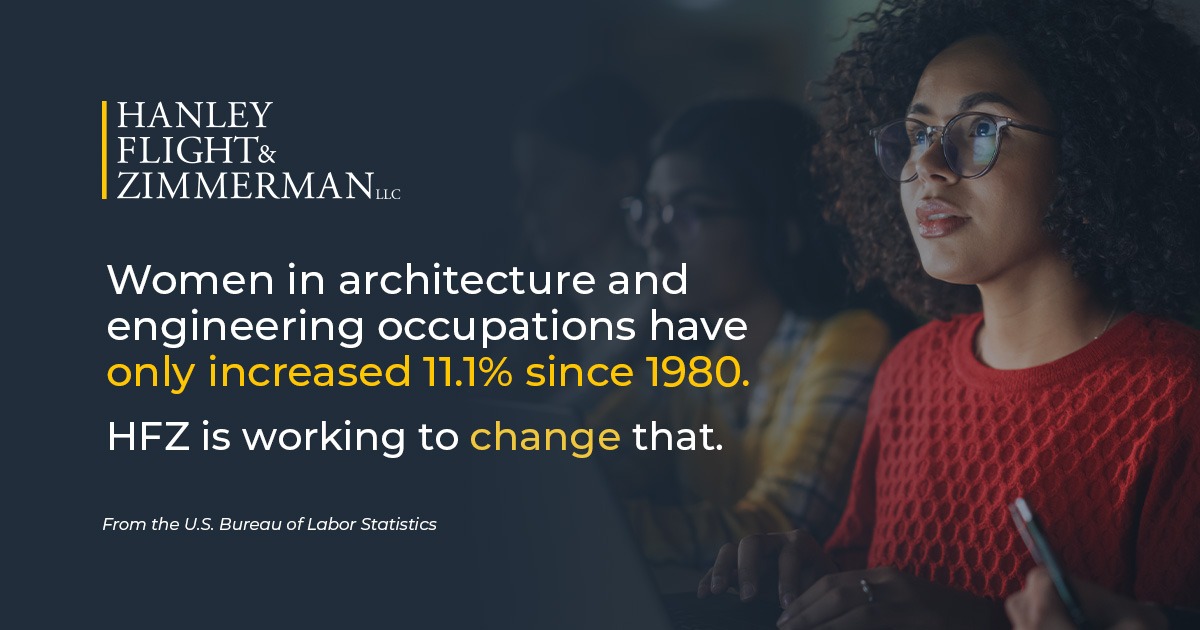June 23 is International Women in Engineering Day, an awareness campaign created to celebrate the work and achievements of women engineers.
As part of this year’s celebration, Hanley Flight & Zimmerman recognizes and applauds the contributions of our women engineers. We also sat down with two of our practitioners to listen to their stories about breaking through in male-dominated industries — engineering and patent law — and their thoughts on increasing the representation of women in these fields.
The number of women in architecture and engineering occupations in the workforce has only increased 11.1% in the last 40 years, to 16.1% in 2022, according to the U.S. Bureau of Labor Statistics. Obviously, women in engineering fields are still woefully underrepresented. Only 1 in 10 employed electrical engineers in 2021 were women, out of nearly 280,000 nationwide, according to Census Bureau data.
Taylor Grote, a Patent Engineer at HFZ, saw these low percentages firsthand while studying for her bachelor’s degree in Electrical Engineering at Purdue University. During a summer internship, she said it was “in your face obvious that I would be working alongside mostly men for the foreseeable future.” One full-time mechanical engineer and one other intern were the only women in the company’s engineering department.
Those numbers didn’t discourage her from working in the field. In high school, Taylor excelled in math and loved all her history classes, leading to a suggestion from her father that she explore patent law as a career. After her summer internship and graduation, Taylor joined HFZ, where she helps the firm’s clients secure patent protection. She’s also enrolled in law school, continuing her quest from engineer to patent engineer to patent lawyer.
While women comprise 37% of licensed attorneys, they represent just 17% of patent attorneys, according to a 2021 American Bar Association survey. Taylor says being a woman engineer in Intellectual Property law holds personal significance.
“I took a very different career path than my girlfriends, which wasn’t necessarily easy. And not because engineering is harder, but simply because I’m not able to relate to their careers as easily and I was making different friends than them,” she said. “So at times, I may or may not have wanted to switch my career. But I didn’t switch — and I absolutely love where I’m at now.”
Marianne Buckley, a patent attorney and Capital Partner, agrees with Taylor that HFZ has supported them and their career growth. Before graduating law school and joining HFZ, Marianne earned a bachelor’s degree in Biomedical Engineering and worked in the research and development department of a healthcare data analytics company. Today she prosecutes U.S. and foreign patent applications in the biomedical, mechanical and electro-mechanical arts, working with a wide variety of technologies, including medical devices, electronic user devices, automotive vehicles, aircraft, child care products, information and process management systems, and more.
“I’m grateful for the opportunities that HFZ has given me from day one to participate in many aspects of the firm, to interact with clients, and to develop my career in an environment that values hard work and professionalism,” she said.
Marianne says HFZ is “ahead of the game” in recruiting to increase the number of women in the field of patent law by attending engineering career fairs at universities.
“This enables us to introduce patent law as a career path for women pursuing an engineering degree earlier — as compared to engineers who may not be introduced to patent law until later in their careers while working in the industry,” she said, adding that HFZ also holds information sessions about patent prosecution for first- through third-year law students, furthering outreach.
Taylor says continuing to educate women, and girls, about the opportunities in engineering and patent law — in these ways and even earlier, such as in high schools — will help increase interest in these fields, and in turn produce the next generation of patent practitioners at HFZ and beyond. While more work needs to be done, nearly one-third — 28% — of HFZ’s practitioners are women.
“I think the environment at HFZ lends itself to support and encourage women to grow in the profession,” she said. That environment will continue to strengthen HFZ as it continues to grow with some of the most talented professionals in patent law.

